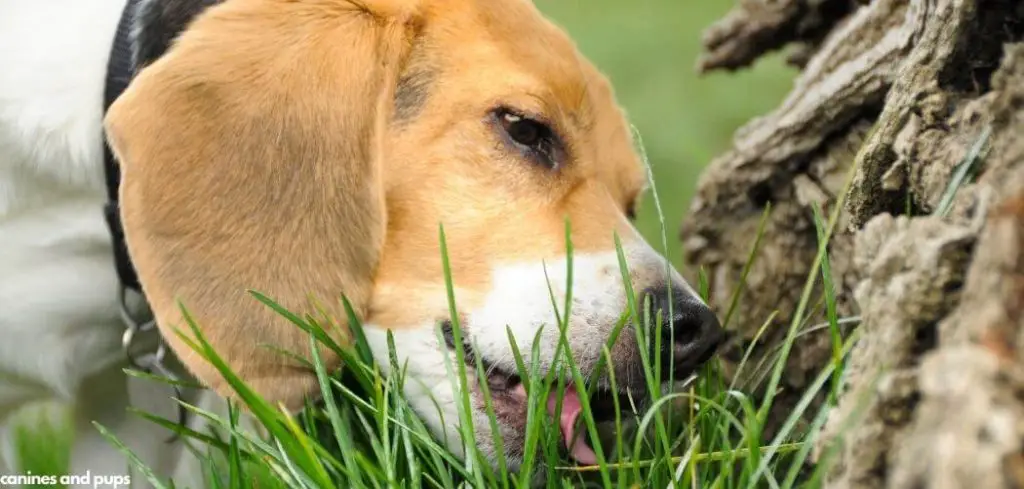When a dog starts eating excessive amounts of grass, it can leave owners feeling confused and concerned.
While many dogs occasionally nibble on grass, consuming it in large amounts may point to underlying health or behavioral issues that need attention.
We outline the common reasons why a dog may eat excessive amounts of grass, what you can do at home, and when to seek veterinary help.
Dog Eating Excessive Amounts of Grass — Why It Happens
Dogs may eat excessive amounts of grass due to digestive upset, nutritional deficiencies, anxiety, boredom, or underlying illness. Some dogs instinctively turn to grass to trigger vomiting and ease stomach discomfort, while others chew grass compulsively as a way to relieve stress.
In certain cases, excessive grass eating can be linked to more serious issues such as gastrointestinal disease, parasites, or even endocrine problems.
Regardless of the cause, when the behavior becomes frequent and excessive, it’s important to pay close attention.

Dog Eating Excessive Amounts of Grass: Common Causes
Digestive Upset
One of the most common reasons for dogs eating excessive grass is gastrointestinal discomfort. Dogs may instinctively eat grass to induce vomiting, which helps them expel something irritating from their stomach.
Owners often notice that after consuming large amounts of grass, their dog vomits shortly afterward, sometimes bringing up yellow bile or undigested food.
While occasional vomiting after eating grass isn’t unusual, repeated or chronic episodes can signal more serious digestive issues that require veterinary evaluation.
Read more: Dog Eating Grass and Licking Everything (Here’s what it means)
Nutritional Deficiencies
Dogs lacking certain nutrients or fiber in their diet may seek out grass to supplement what they’re missing. Grass contains small amounts of fiber, minerals, and trace nutrients that can temporarily satisfy these cravings.
If a dog’s diet is not properly balanced, excessive grass eating can become a daily behavior. This is especially common in dogs on low-quality kibble or unbalanced homemade diets.
Nutritional gaps should always be addressed, as long-term deficiencies can lead to poor coat health, low energy, and increased illness.
Anxiety and Stress
Some dogs eat grass as a coping mechanism when they feel anxious or stressed. Just like people may bite their nails, dogs may compulsively chew on grass as a way to self-soothe.
Stress-related grass eating may appear during thunderstorms, separation from owners, or changes in routine.
Unlike occasional grazing, these dogs tend to eat grass frantically and in large amounts, showing a compulsive pattern. This behavior is often paired with pacing, whining, or panting.
Boredom or Lack of Stimulation
Dogs left without adequate exercise or mental stimulation may eat grass simply out of boredom. Chewing provides an outlet for excess energy and helps occupy their time.
This is more common in younger dogs and active breeds that require more physical and mental engagement.
If the grass eating is primarily happening in the yard or during walks when no toys or stimulation are available, boredom may be the driving cause.
Gastrointestinal Diseases
In some cases, excessive grass eating may be linked to chronic gastrointestinal issues such as gastritis, inflammatory bowel disease (IBD), or pancreatitis. These conditions can cause persistent nausea and abdominal discomfort, leading dogs to turn to grass for relief.
Owners may also notice other concerning signs like chronic vomiting, diarrhea, weight loss, or a poor appetite.
Because these conditions require medical management, excessive grass eating paired with digestive changes should not be ignored.
Parasites
Intestinal parasites such as roundworms, hookworms, or giardia can irritate a dog’s gastrointestinal tract, leading to nausea and abnormal eating behaviors. Some dogs with parasites eat grass excessively in an attempt to soothe their stomachs.
Other signs may include scooting, diarrhea, weight loss, or a pot-bellied appearance. Regular deworming and fecal testing are essential to rule this out as a cause of excessive grass consumption.
What to Do If Your Dog Is Eating Excessive Amounts of Grass
If your dog is eating excessive amounts of grass, start by observing when and how often the behavior happens. Occasional grazing may not require intervention, but compulsive or daily consumption should raise concern.
Providing a well-balanced, high-quality diet with adequate fiber can help if the behavior is related to nutritional needs. Increasing physical exercise and mental enrichment—through puzzle toys, training games, and more interactive play—can reduce grass eating driven by boredom.
For dogs with stress-related grass eating, offering a calm environment, safe spaces, and natural calming aids may help reduce anxiety. If the behavior persists or worsens, a veterinary exam is the safest step.
When to Call or Visit Your Vet
Excessive grass eating combined with frequent vomiting, diarrhea, or refusal to eat should prompt a veterinary visit. These symptoms can signal more serious underlying gastrointestinal problems that require medical attention.
If your dog suddenly increases grass consumption with no obvious changes in routine or diet, it’s important to rule out illness. Puppies, senior dogs, and those with preexisting health issues are at higher risk of complications and should be monitored closely.
Any signs of lethargy, weight loss, blood in stool, or abdominal pain along with grass eating are urgent red flags. Early intervention can help address the cause before it worsens.
Read more: Dog Eating Grass Excessively (Here’s Why)
Key Takeaway
When a dog is eating excessive amounts of grass, it may be a sign of something more than just quirky behavior. While mild grazing can be normal, compulsive or frequent consumption may indicate digestive upset, nutritional imbalance, or even disease.
Providing a balanced diet, ensuring adequate exercise, and addressing stress can help in some cases, but persistent or severe symptoms should always be evaluated by a veterinarian.
With careful attention and timely care, most dogs can move past this concerning behavior and return to healthy, happy routines.
